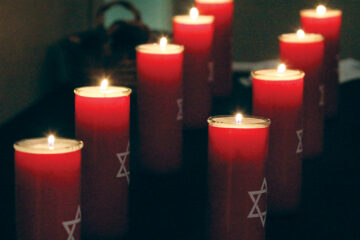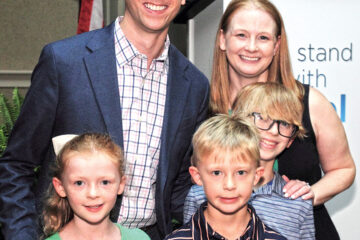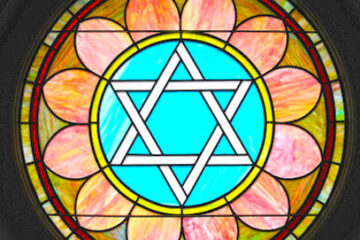For Israeli survivors of Oct. 7, speaking tour becomes form of therapy
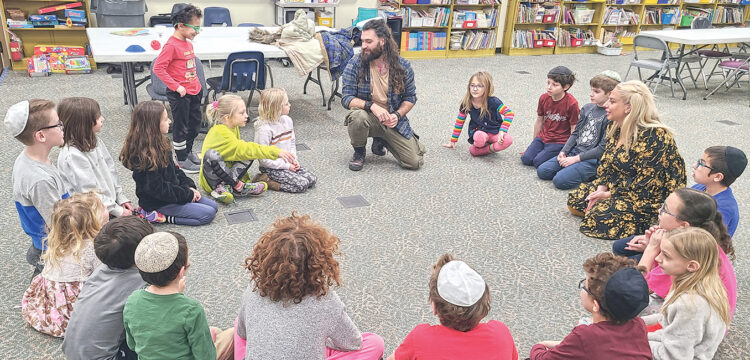
By Marshall Weiss, The Dayton Jewish Observer
For an hour on March 19, four Israelis shared their stories with members of Dayton’s Jewish community and allies about how each survived the Oct. 7 Hamas massacre.
Halfway through the program, moderated by Jewish Federation President-Elect Dan Sweeny, Eitan Frankl of Kibbutz Nirim shared with the audience, “The fact that you’re listening to us — you don’t know how important it is. It really helps. Because this is therapy. The best therapy we have.”
He said he didn’t talk about the horrors of Oct. 7 for five months.
“We all talked about it with some of our friends, but not like this. Nobody listened to us like that. So thank you.”
Dayton’s program marked the third time Frankl and the other Israelis had talked about their traumas of Oct. 7 on this one-week speaking tour of the United States via the Jewish Agency for Israel and the JCC Association of North America.
They had already visited Youngstown and would next head to Toledo and then to communities in New Jersey.
“It’s not the Jews of the Diaspora anymore,” said Klil Valiano, who credited luck for his eventual escape from the Nova Festival. “It’s our family from abroad, especially for us, the Jewish people in Israel. Everyone always accepts us with big hugs and warm feelings. It feels like home outside of Israel. In a different country, you can relax.”
Inor Roni Kagno was the Nova Festival’s official photographer. This was where Hamas brutally slaughtered 364 civilians and took at least 40 hostages.
Kagno said his visit to the United States was his personal way of dealing with PTSD.
“It’s very important to keep doing stuff and be productive,” Kagno said. “We’re still very traumatized. We hear a big noise or even the kids, you kind of jump out. You go in a room and start calculating how many exits if someone will start shooting at us.”
Gitit Botera from Sderot said when she heard a tornado siren in the Dayton area, it set her off.
“I wanted to come here because on 7 October, the terrorists raped a lot of the women. And men,” Botera told The Observer. “And I want to speak about this. Because we have a lot of murdered women who will never speak again. This is, I think, my mission.”
For Botera and Frankl, arranging with their families to take a week in the United States wasn’t easy. But they needed to for their emotional health.
In 2021, Botera, her husband, and their baby daughter survived a direct rocket hit to their home in Sderot on the border with Gaza.
“After this, I started to go to therapy,” she said. “And I said to myself, ‘Now I have control. It will not touch me again.'”
On Oct. 7, 2023, the three hid in their safe room for nine hours, surrounded by terrorists from Gaza.
“I think some people are trying to open my house door,” she recalled. “After this, I come to the kitchen. I take a knife. I come back to the shelter. This time, we don’t have a (cell) connection.
We don’t have water, toilet. Nothing. We sit on the floor, without light. And we hear they are shooting outside.”
The whole time, she said, her 4-year-old daughter asked her, “Mommy, what’s happened?”
“And I said, ‘Please don’t speak. Somebody can hear you.’ And I take my hand and I close her mouth. My heart is racing. I feel I’m not a good mommy because I cannot protect my family. On 7 October, somebody came and tried to murder me in my place. In my house. My resilience broke.”
Even so, she returned to Sderot to give tours to visiting delegations. “It’s good for me to speak about this.”
Frankl and his wife first hid in the safe room of their house at Kibbutz Nirim when the Hamas onslaught began. The IDF arrived and rescued them to hide in the kibbutz community hall, where they remained for 20 more hours with 400 people.
When the opportunity came up for Frankl to come to the United States, he talked to his wife.
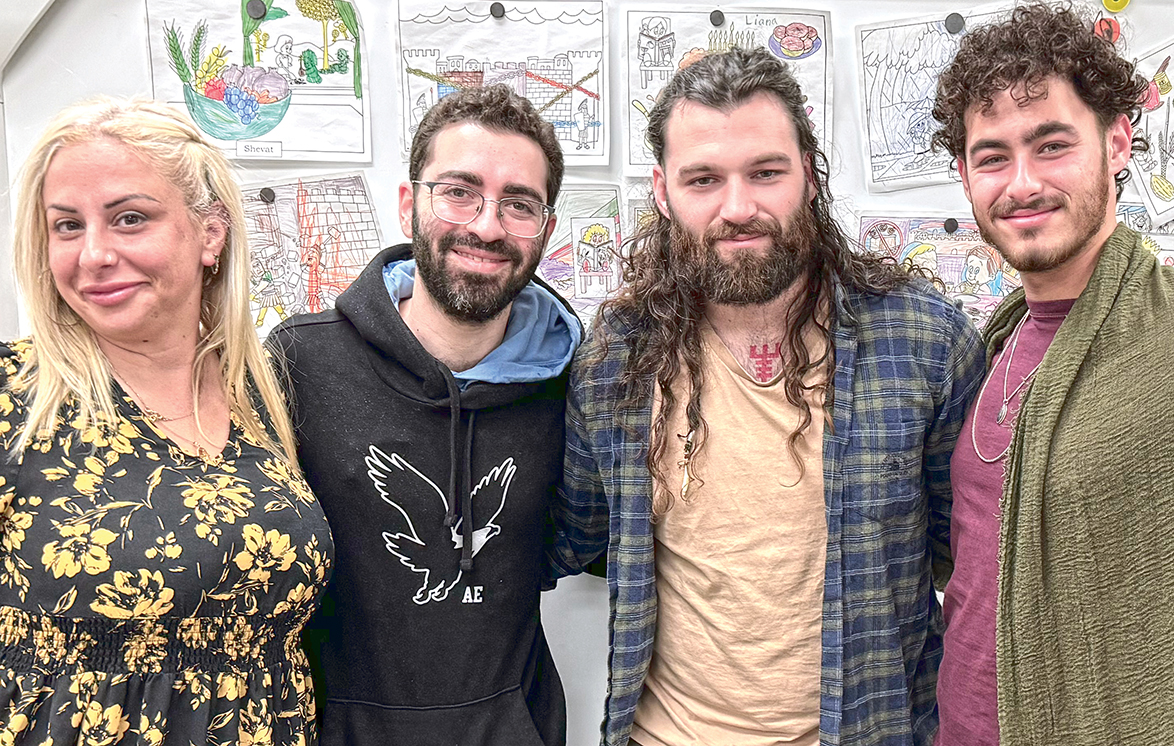
“I have to go away,” he told her. “I can’t be around this anymore. I need to be a week out, even if it’s only talking about what happened — it’s not being here.”
“It’s really, really helped me,” he told The Observer. “I’m much better than I felt in Israel.”
Valiano said that talking about Oct. 7 here helps.
“Each time we get a chance to talk about our story, we get it from a bit of a different angle.”
It comes with a toll. “If you talk about it three times a day, we add a few little details and a couple of memories might jump back.”
To Valiano, the most therapeutic aspect of the tour has been the embrace of the U.S. Jewish communities.
However, the Israelis told The Observer they navigated a difficult encounter when they spoke at Youngstown State University, April 18.
Near the beginning of a program put together by the university’s Center for Judaic and Holocaust Studies, three people who identified themselves as students walked in wearing keffiyeh scarves, a symbol of Palestinian nationalism.
“They waited for us to start talking to enter the room,” Valiano said.
“I asked them from the stage, ‘Hey guys, how are you doing?'” Frankl said. “‘Could I ask you why you came here?’ They said they have the right to be there. And they were giggling all the time. And they just came to provoke. When we come, we want to be listened to, and to listen to other people. But when they came, they came just to speak what they wanted to say and walk away.”
Frankl said that one of the three asked him if he thinks there’s genocide in Gaza.
“We are not in politics,” Frankl told The Observer. “We did nothing. We came to share our stories. We didn’t come to speak about the Gaza problem. They did that and walked away.”
When asked what Jews here can do to best help Israelis, Frankl said to keep inviting Israelis here and to visit Israel. With a caveat: “Come and see what can happen when we’re divided.”
Valiano added an explanation. “Oct. 7 brought us (Israelis) closer, yet we still have years of difference of opinion. Differences of ways of life. We have to rebuild. It won’t be easy. But it’s the only way for Israel to survive.”
He urged adults in Dayton’s Jewish community to share the stories they’ve heard with the younger generation.
“Because the younger generation is going to be the future. Connecting them more to Israel and the Jewish tradition is the most important thing we can do as the Jewish people all around the world.”
To read the complete May 2024 Dayton Jewish Observer, click here.


